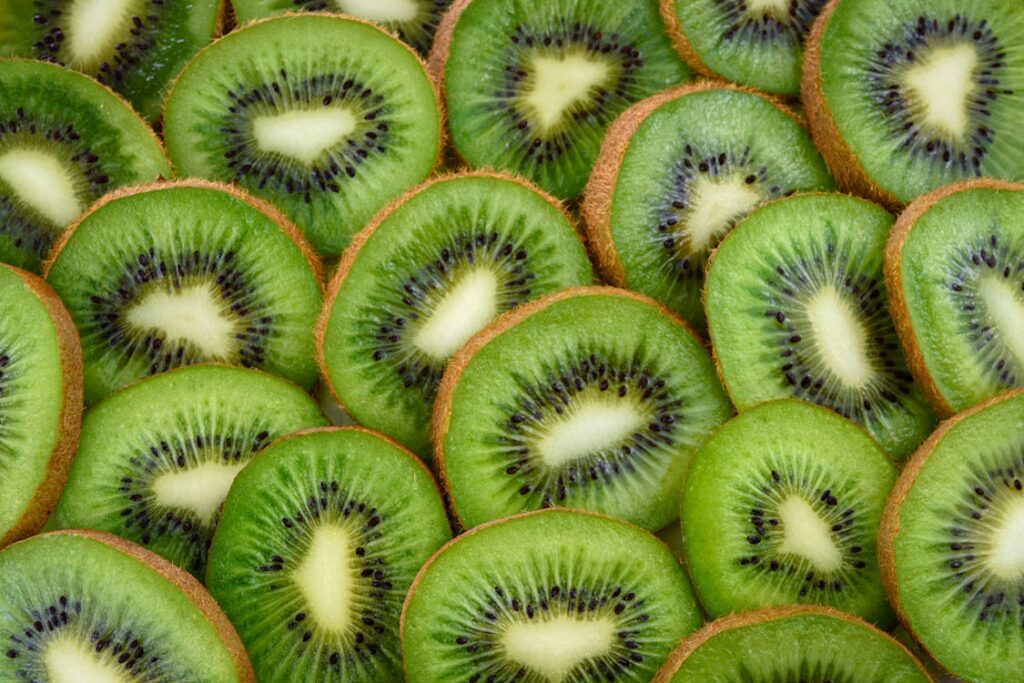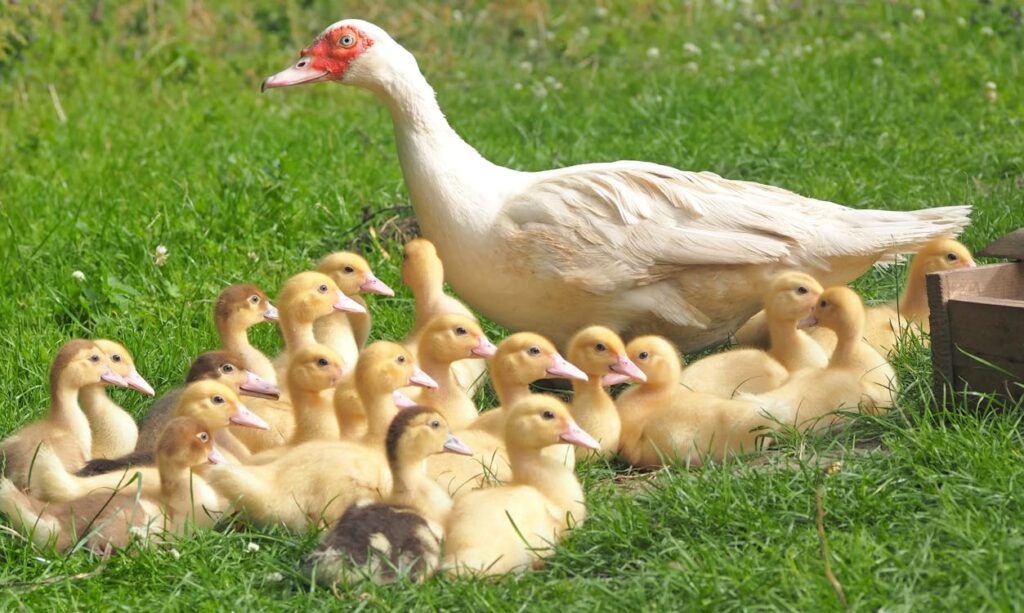Sharing a juicy kiwi with your feathered friends is a tempting gesture. But can ducks actually eat kiwi? The answer is yes, with a few important caveats. While kiwis can offer some health benefits, moderation and proper preparation are key to avoiding any digestive troubles for your ducks. This guide shares the details of feeding kiwi to ducks, exploring the potential benefits, things to watch out for, and how to incorporate it into a balanced diet.
The Benefits Of Feeding Your Duck Kiwi
Kiwis boast a range of vitamins and minerals that can be a welcome addition to your duck’s diet in small amounts. Here’s a breakdown of some key benefits:
- Vitamin C Powerhouse: Just like chickens, ducks can benefit from the immune-boosting properties of Vitamin C. This essential vitamin helps ducks fight off infections and promotes healthy tissue growth. Kiwis are a great source of Vitamin C, offering a refreshing and delicious way to supplement their diet.
- Fiber for a Healthy Gut: Kiwis are a good source of dietary fiber, which plays a crucial role in a duck’s digestive health. Fiber helps regulate digestion, prevents constipation, and promotes the growth of good bacteria in the gut.
- Potassium for Proper Functioning: Potassium is a vital mineral that supports proper muscle function and nerve transmission in ducks. Kiwis offer a natural source of potassium to aid these essential bodily functions.
- A Touch of Sweetness (In Moderation): While not overly sugary, kiwis have a naturally sweet taste that can be appealing to ducks. However, it’s important to remember that ducks shouldn’t consume excessive amounts of sugar.
- Hydration Hero (Especially in Summer): Kiwis are a juicy fruit, providing much-needed hydration, especially during hot summer months. Keeping your ducks well-hydrated is crucial for optimal health, feather quality, and egg production in laying ducks.
Things To Watch Out For When Feeding Kiwis
While kiwis can offer some health perks, there are potential downsides to consider:
- High Oxalate Content: Kiwis contain oxalates, a naturally occurring compound found in many plants. While not inherently toxic, excessive oxalate intake can lead to kidney issues in some animals, including ducks. Moderation is key to avoid any potential problems.
- Choking Hazard Potential: The small, black seeds in kiwis can pose a choking hazard for ducks, especially younger ducklings. It’s best to remove the seeds entirely before offering kiwi to your ducks.
- Skin Can Be Difficult to Digest: The fuzzy skin of a kiwi can be tough for ducks to digest. It’s advisable to peel the kiwi before offering it to avoid any digestive discomfort.
- Sugar Content (Again!): As mentioned earlier, kiwis do contain some natural sugar. While not a major concern in small amounts, avoid overdoing it to prevent weight gain and other health problems.
- Not All Ducks Like It: Ducks, like us, have individual preferences. Some ducks might simply not enjoy the taste or texture of kiwi. Don’t force them to eat it if they’re not interested.

How Often Should You Feed Your Duck This Food?
As with any treat, moderation is key when offering kiwi to your ducks. Here’s a guideline:
- Treat, Not Staple: Consider kiwi a treat, not a regular part of your duck’s diet. Aim for no more than a small slice (think about an inch square) per duck, once or twice a week.
- Start Slow: If you’re introducing kiwi for the first time, start with a tiny piece and observe your ducks for any signs of digestive upset. Gradually increase the amount based on their tolerance.
- Monitor Their Health: Keep an eye on your ducks’ droppings and overall behavior after consuming kiwi. If you notice any changes like diarrhea, loss of appetite, or decreased activity, stop feeding them kiwi immediately.
How To Prepare Kiwi When Feeding Your Duck
Here’s how to safely prepare kiwi for your feathered friends:
- Wash It Up: Give the kiwi a good rinse under running water to remove any dirt or pesticides from the peel.
- Peel It Perfect: Carefully peel the kiwi, removing all traces of the fuzzy skin. As mentioned earlier, the skin can be difficult for ducks to digest.
- Seed Separation: Cut the kiwi into small, bite-sized pieces and remove all the black seeds. Remember, these seeds can be a choking hazard for ducks.
- Fresh is Best: Avoid offering kiwi that’s past its prime or starting to mold. Stick to fresh, firm fruit for your ducks.
Can Baby Ducks Eat This Food?
No, baby ducks (ducklings less than 6 weeks old) should not be given kiwi. Their digestive systems are still developing and highly sensitive. The high oxalate content, potential choking hazard from seeds, and difficulty digesting the skin can all cause serious health problems for young ducklings. Stick to a balanced chick starter feed specially formulated for their delicate needs during this crucial growth period.

What Other Foods Can Ducks Eat?
Ducks are omnivores, meaning they enjoy a variety of foods alongside their commercial feed. Here are some healthy and safe options to complement their diet:
- Fruits and Vegetables (Chopped): A small selection of chopped fruits and vegetables can provide essential vitamins, minerals, and dietary fiber. Good options include chopped apples (minus the core and seeds), blueberries, raspberries, strawberries, leafy greens like kale and romaine lettuce (in moderation due to potential for crop upset), chopped cucumbers, grated carrots, cooked sweet potatoes, and chopped broccoli florets.
- Grains and Seeds (Occasionally): Small amounts of cooked grains like brown rice, quinoa, or barley can be offered as an occasional treat. A sprinkle of birdseed or cracked corn can also be provided for enrichment, but avoid overdoing it as these can be high in carbohydrates.
- Aquatic Plants (The Natural Choice): Ducks love to forage for aquatic plants like duckweed, azolla, and water lettuce. If you have a pond in your duck enclosure, these plants can provide a natural source of nutrition and entertainment for your feathered friends. However, ensure the plants are healthy and free of pesticides before allowing your ducks access.
- Protein-Rich Treats (In Moderation): Small amounts of protein-rich treats like chopped earthworms, mealworms, or crickets can be offered as a special treat. These can be a great source of protein for growing ducklings or breeding adults.
How To Give Your Duck A Healthy And Balanced Diet
The foundation of a healthy duck diet should be a good quality, commercially prepared duck feed formulated for their age and life stage (grower feed for young ducks, layer feed for laying ducks). This feed will provide all the essential nutrients your ducks need to thrive. Here are some additional tips for creating a balanced diet:
- Fresh Water is Vital: Ensure your ducks have access to clean, fresh water at all times. Water is crucial for proper digestion, feather development, egg production, and overall health.
- Provide Grit (For Adults): Adult ducks (over 6 weeks old) benefit from having access to grit (small pebbles or crushed rock). Grit aids digestion in ducks by helping them grind up their food. You can purchase grit from farm supply stores or mix it into their feed.
- Offer Variety (In Moderation): While a balanced feed is essential, supplementing with small amounts of fruits, vegetables, and other treats can enrich your duck’s diet and provide them with mental stimulation while they forage.
- Observe Their Eating Habits: Pay attention to how much your ducks are eating and adjust their feed portions accordingly. Overfeeding can lead to obesity, fatty liver disease, and other health problems in ducks.
Final Verdict
Kiwis can be a refreshing and occasional treat for your ducks, offering a boost of Vitamin C, fiber, and hydration. However, it’s important to prioritize their well-being by following the preparation and feeding guidelines outlined above. Remember, moderation is key, and a balanced, commercially prepared duck feed should be the cornerstone of their diet. If you notice any signs of digestive upset after introducing kiwi, discontinue feeding it and consult a veterinarian if necessary.
For any significant changes to your duck’s diet, consulting with a veterinarian or poultry specialist is always a good practice. They can advise on the most suitable options based on your ducks’ specific needs and health conditions.

